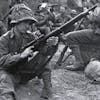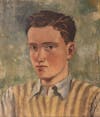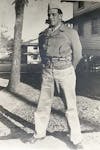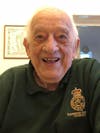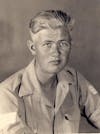54 Okinawa - The Last Great Battle of the Second World War, book passages

Saul David's new book, Crucible of Hell.
When the battle of Okinawa was over, almost a quarter of a million people had lost their lives, making it by far the bloodiest US battle of the Pacific. The horror of the battle ultimately determined President Truman’s choice to use atomic bombs in August 1945.
Extracts from Saul David's Crucible of Hell - An action-packed and powerful new narrative of the Battle of Okinawa – the last great clash of the Second World War, and one that had profound consequences for the modern world.
"The American soldiers emerged from the thousand-odd landing craft, thrusting onto the shore. It was as if the sea itself were advancing with a great roar.
"He looked to his right and saw his assistant driver, Kahn, ‘frantically jerking’ at the hatch lever. ‘We’re on fire,’ yelled Kahn, ‘and the hatch is jammed!’
Normandy Memorial Trust Appeal - 75 veteran D-Day stories
More great unpublished history!
Second world war
Interested in Bill Cheall's book? Link here for more information.
Fighting Through from Dunkirk to Hamburg, hardback, paperback and Kindle etc.
Fighting Through Podcast – Episode 54 – Okinawa - The Last Great Battle of the Second World War
More great unpublished history! WWII
The USS Eldorado slowed as it approached the west coast of Okinawa in the pre-dawn darkness. Ahead, could be seen the muzzle flashes of naval guns, arcing trajectories of red-hot projectiles, the glow of fires on a distant blur of shoreline.
The bow doors opened and, one by one, the amtracs splashed into the water as ‘Good luck Marines’ sounded on the ship’s loudspeaker. Looney was half expecting his amtrac to ‘go directly under’, but it stayed afloat and moved slowly towards land.
The American soldiers emerged from the thousand-odd landing craft, thrusting onto the shore. It was as if the sea itself were advancing with a great roar.
He looked to his right and saw his assistant driver, Kahn, ‘frantically jerking’ at the hatch lever. ‘We’re on fire,’ yelled Kahn, ‘and the hatch is jammed!’
Hello again and another warm WW2 welcome to you. I’m Paul Cheall, son of WW2 veteran Bill Cheall. The FT podcast features cracking first-hand memoirs and memories of war veterans – and much more.
Today we’re moving away from the European theatre of war to the Pacific, an area I’ve been looking to cover for some time and I’ve prepared a passage from a new military history book.
Before that I’d just like to repeat my best wishes to anyone affected by the Corona virus. It’s likely we all know someone who’s been affected. And I certainly know people who have been impacted to varying degrees. So I hope you and your friends and family are keeping as safe as you can be and will continue to be so.
….
SAUL DAVID Crucible of Hell Okinawa –
I was recently listening to the History Extra podcast where they were interviewing historian Saul David about his new book and I enjoyed the interview so much I thought I’d contact Saul to see if I could nick one of his chapters for the FT podcast. And he kindly agreed.
But before I crack on I want to mention the subject of donations to the show. From now and evermore, I have decided to give any future donations I receive directly to worthy causes. So pound for pound, dollar for dollar, it’ll go to charity. For now, I’ve chosen the salvation army, basically because it was always one of Dad’s favourite charities, and that was because they were always helping the troops during the war. And today they continue to help those who need food, safe shelter, and much more.
WW2 and WWII, World War II and more
Just one example, taken from his recollection of returning to England from Dunkirk in 1940, after getting on board the Lady of Mann at the East Mole at Dunkirk.
TR
“I remember that during the journey to England most of us had snatches of sleep by just supporting each other; we were so exhausted by the lack of sleep, that nothing could keep us
awake. Early morning, after it had become light, somebody shouted, ‘Hey, look
across there!’ We saw the White Cliffs of Dover, and it was a beautiful sight. In
a little while, the ship slowed down and soon edged its way to the dockside at
Folkestone.
There was a tremendous welcome from everybody awaiting our arrival. Those
good Samaritans of The Salvation Army and of the Women’s Voluntary Service
made us most welcome and plied us with sandwiches and mugs of good strong
tea, and before we had time to gather our wits we were boarding trains. It was
unbelievable that we had escaped from Dunkirk. So many good soldiers, the fighting
rear guard in particular, would have to surrender and spend the remainder of the
war in prison.”
So if you enjoy the show, I’m so pleased and that’s really all I could ask for. But if you feel inclined to offer a little monetary support, then either carry on donating through Patreon or PayPal, or just as good, donate a few dollars directly to any cause you think is worthy and if you have time, drop me a line to let me know. The Sally army is easy to google and right now they have a page set up to take donations to help with the Coronavirus.
I now want to introduce you to a new book from award-winning historian Saul David. Welshman Saul is a military historian and broadcaster.
His multi award-winning history books include The Indian Mutiny, Zulu and Operation Thunderbolt, about the Raid on Entebbe Airport. Saul is well known for appearing in various documentaries on British television. He's also written a number of acclaimed fictional novels.
And he is Professor of Military History at the University of Buckingham in England.
This is the blurb from the book cover:
Crucible of Hell is an action-packed and powerful new narrative of the Battle of Okinawa – the last great clash of the Second World War, and one that had profound consequences for the modern world.
When it was over, almost a quarter of a million people had lost their lives, making it by far the bloodiest US battle of the Pacific. In Okinawa, the death toll included thousands of civilians lost to mass suicide, convinced by Japanese propaganda that they would otherwise be raped and murdered by the enemy. On the US side, David argues that the horror of the battle ultimately determined President Truman’s choice to use atomic bombs in August 1945.
Using graphic eyewitness accounts and declassified documents from archives in three continents, Saul David illuminates a shocking chapter of history that is too often missing from Western-centric narratives of the Second World War.
So here we go with the Prologue from the book.
>>>>> PROLOGUE
TR
That was taken from Saul David’s new book, Crucible of Hell.
I’d like to say many thanks to Saul for letting me use this passage in the show.
And if you want to hear his thoughts on how one of the bloodiest clashes of the Pacific War played a crucial part in the US decision to use atomic bombs against Japan, catch up with the History Extra podcast - Okinawa, The Battle and the Bomb. Better still buy his book Crucible of Hell.
And for just a tiny bit more from Saul, stick around for the PS from Hacksaw Ridge – Oof my word!
Next episode:
More Lancaster stuff
I’ve got another interview to share with you next time. It’s borrowed with permission from the International Bomber Command Centre Digital Archive based at the University of Lincoln in England.
Les Rutherford describes his escape from Dunkirk upon returning to the United Kingdom and joining 50 Squadron in the Royal Air Force. He also describes his training in South Africa and his experience of being shot down, interrogated and imprisoned in Stalag Luft III. Ooof my word!
You’ve been listening to the Fighting Through Podcast, Episode 54 Okinawa Crucible of Hell
Thank you so much for listening. Please do hear me next time.
PS
This is a passage from the Hacksaw Ridge chapter 24 from the book Crucible of Hell.
tr
The radio crackled into life. It was an order to move the tank ahead of the lines, at the base of a ‘fairly high ridge’. Their task was to fire into the caves and emplacements on the ridge face. Once in position, Anderson began firing the 75 mm cannon, its shells exploding in a sheet of flame and smoke, as great chunks of coral and concrete were blasted into the air.
Another tank, away to their right, was doing the same. Then suddenly Dick could hear explosions just behind them, almost certainly from Japanese heavy mortars or artillery. Anticipating an order to withdraw, Dick grabbed the shift lever with his right hand and prepared to put the tank in reverse. The tank shook from a direct hit. Badly concussed, Dick did not hear or feel a thing. But he knew that something was wrong.
‘Everywhere I looked, it was as if I had red goggles on.’ Gazing back up into the turret, he could see someone’s foot disappearing out of the commander’s open hatch. He then looked to his right and saw his assistant driver, Kahn, ‘frantically jerking’ at the hatch lever. ‘We’re on fire,’ yelled Kahn, ‘and the hatch is jammed!’
Dust clouded the air so thickly that it obscured Dick’s vision. He realised it had been thrown up by the explosion, and was not smoke from a fire. ‘Calm down!’ he yelled. ‘There is no fire!’ Kahn seemed to heed Dick’s words, but then reached up, opened the hatch and was gone. Dick was the last of the crew of five still in the tank. He felt strangely calm and, noticing the engine was still running, tried to put the tank into gear. But all he could hear was the grinding of metal. The shell must have hit the back deck, he reasoned, and messed up something in the shift mechanism.
As he tried again without success, he could hear Anderson yelling at him to get out. He shouted back, ‘I’ll be right out.’ He reached for the Tommy gun that, every morning, he put in the space behind the dash panel. But it seemed stuck and would not budge. Leaving it, he stood up so that his head was just above the hatch entrance.
Suddenly his head jerked back involuntarily – yanked by the intercom cord that he had forgotten to unplug – just as a bullet struck the edge of the hatch. His error probably saved his life. Having now unplugged the wire, he grabbed the hatch opening with both hands and launched himself out and over the side of the tank, ‘landing in a heap in the dirt’ before scrambling round to the far side where Anderson and Bomax were crouching by the front-left drive socket.
The air was full of small-arms fire, the ‘dry branch-like snap’ of bullets making them flinch repeatedly. ‘We’d better get out of here,’ shouted Dick. ‘Those guys are bound and determined to get us.’ With that he took off running, zigzagging as he went, before taking cover in a shell hole. Moments later Anderson joined him as, all around, bullets were sending up little geysers of dirt. Dick was pondering his next move when he saw the other tank moving back. He ran over to it and motioned for the crew to drop the escape hatch. While he waited, crouching low, he was joined by Anderson and Bomax, who had now appeared.
To lessen the chances of being shot, Dick slid under the rear of the Sherman and wiggled through the narrow escape hatch. He could see Anderson through the hatch and asked him what was wrong. ‘The lieutenant’s been hit,’ replied Anderson. Bomax had tried to slide under the front of the tank and was shot in the back just two feet short of the hatch. Anderson was trying to manhandle him into the tank, but it was impossible.
Meanwhile the tank commander, Sergeant Boggs, had spotted a Japanese soldier with a satchel charge on the bank above. His gunner tried to shoot the soldier with the .30 calibre coaxially mounted machine gun, but that jammed. So Boggs opened his hatch and let rip with his pistol. When that ran out of ammo, he used his Tommy gun, eventually hitting the enemy soldier. Anderson was still trying to get Bomax in the tank. But at 185 pounds Bomax was just too heavy.
Worried he might lose a second tank, the company commander ordered Boggs to leave Bomax and withdraw. He would see to it that the infantry recovered the lieutenant’s body after dark. By the time they got back, Anderson was a mess: he was sobbing and could not feel his legs, [EVEN] though there was no sign of a wound. Dick was not much better. ‘My nerves were so shot’, he recalled, ‘I was shaking all over.’
He asked the company medic to give him something to calm him, and was handed ‘green pills, a super aspirin’. It was, he thought, a ‘lousy way to end our first thirty days of fighting’
I’m PC
Featured Episodes
If you're going to binge, best start at No 1, Dunkirk, the most popular episode of all. Welcome! Paul.
PS. Just swipe left to browse if you're on mobile.













